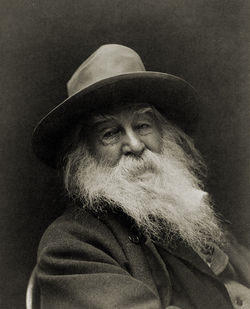Walt Whitman
Walt Whitman (1819 - 1892) was an American journalist, essayist and poet. Whitman's best known work is the poetry collection Leaves of Grass, a book-sized opus written in a flowing free verse style. As well as shorter poems (notably 'A Noiseless Patient Spider'), Leaves of Grass consists mainly of three long poems: ‘I Sing the Body Electric,' ‘The Sleepers,' and ‘Song of Myself'. Whitman first self-published the book in 1855 and continued revising it until his death. Some of its contents were controversial for the Victorian ethics of his time, and it was initially largely overlooked in the United States. Outside the U.S.A., the reception was much better, especially in France, where Whitman's humanism influenced the naturalist literary movement. By 1865, Leaves of Grass had made Whitman famous and was at last accepted by a major publishing house. It is now considered a masterpiece of American literature, and Whitman is regarded as one of the founders of modern American poetry.
Whitman was the prototype of the American self-made man. Born in West Hills, Long Island, New York, he started as an office boy in a law firm, worked a while as a printer, then as a village school teacher, founded several magazines, built houses, and meanwhile continued working on his magnum opus, Leaves of Grass. He nursed wounded veterans in the aftermath of the American Civil War. He never married, never left America, never sought after wealth and property, did not belong to any club, preferred the company of ordinary people and was always optimistic and cheerful. People who knew him well described him as slow moving, tolerant, democratic, responsive, and generous to everyone. He provided vivid, first-hand witness to the sufferings of wounded Civil War veterans. He passed away while living in Camden, New Jersey.
A personal note about recent analysis of Whitman
In modern times, Whitman's popularity and importance has continued to increase, in part because he is seen as embodying acceptance for today's hot topics including androgyny, gayness, and sensuality. A retrospective in The New York Times Style Magazine (Sept. 20, 2020, p. 74) is titled for one of Whitman's most unforgettable and unabashedly sensual poems 'I Sing the Body Electric' and praises Whitman as "an icon of queerness". The article further complains that "For decades, heterosexual critics compmonly treated the homoerotic passages as metaphor...". I do not agree with that analysis, instead preferring to believe that Whitman's works, as with all great writers, stand alone without any knowledge of the author's life whatsoever. I also object to that statement merely on grounds that the author of it had no way to ascertain the sexuality of all the critics who have ever written about Whitman. Nevertheless, it does represent a common modern phenomenon, that his valuation as a writer is actually increased because he is viewed as an early example of a (possibly) gay man living openly with at-that-time-non-mainstream sexual preference.Pat Palmer (talk) 19:33, 20 September 2020 (UTC)
A group of Whitman poems about the Civil War is sometimes published separately under the title Drum-Taps.
Two short samples of his writing
Reading Whitman's free verse can seem a little like wandering in an overgrown, late summer meadow; there will be much of disordered plants, sticks, straws, brambles, tangles, and dense vegetation--and occasionally, clear areas of astonishing beauty.
An excerpt from 'Song of Myself'[1]
A child said What is the grass? fetching it to me with full hands; How could I answer the child? I do not know what it is any more than he.
I guess it must be the flag of my disposition, out of hopeful green
stuff woven.
Or I guess it is the handkerchief of the Lord,
A scented gift and remembrancer designedly dropt,
Bearing the owner’s name someway in the corners, that we may see
and remark, and say Whose?
Or I guess the grass is itself a child, the produced babe of the vegetation.
Or I guess it is a uniform hieroglyphic,
And it means, Sprouting alike in broad zones and narrow zones,
Growing among black folks as among white,
Kanuck, Tuckahoe, Congressman, Cuff, I give them the same, I
receive them the same.
And now it seems to me the beautiful uncut hair of graves.
An extremely beloved short poem
This enduringly popular short poem is a perfect little gem:[2]:
A Noiseless Patient Spider
A noiseless patient spider, I mark’d where on a little promontory it stood isolated, Mark’d how to explore the vacant vast surrounding, It launch’d forth filament, filament, filament out of itself, Ever unreeling them, ever tirelessly speeding them.
And you O my soul where you stand,
Surrounded, detached, in measureless oceans of space,
Ceaselessly musing, venturing, throwing, seeking the spheres to
connect them,
Till the bridge you will need be form’d, till the ductile anchor hold,
Till the gossamer thread you fling catch somewhere, O my soul.
